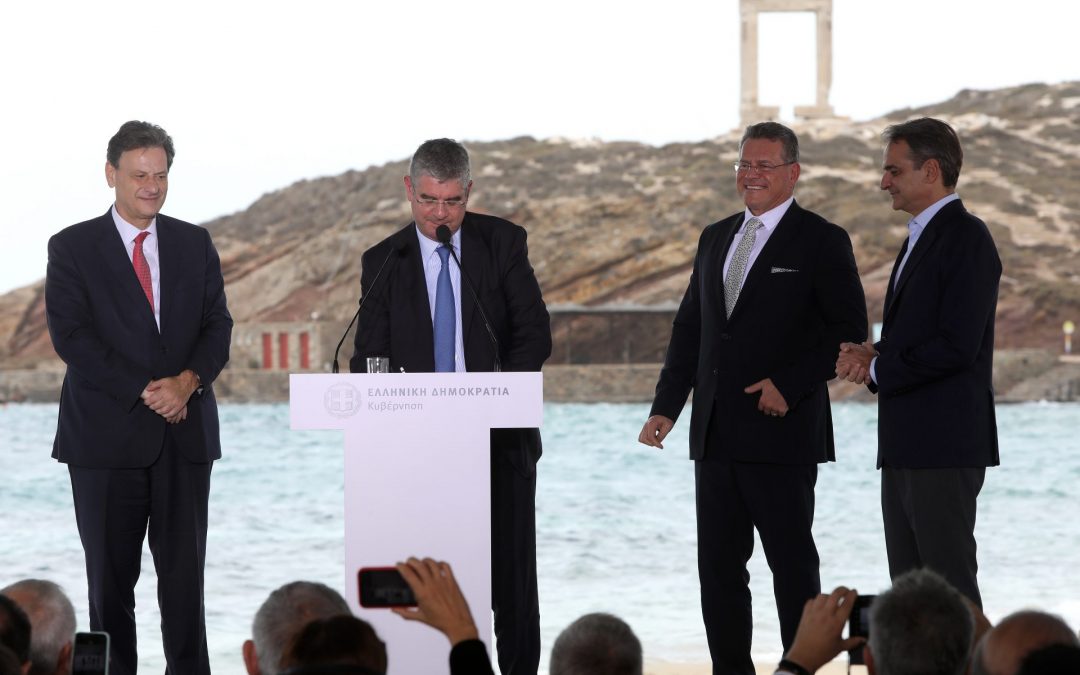“`html
Investments over 5 billion euros in renewable energy sources, electrical interconnections, and water supply infrastructure on the islands, as well as relief of electricity bills for all consumers from the gradual limitation of charges for Universal Service Obligations, will be the results of the operation of the Island Decarbonization Fund. The agreement for the establishment of the Fund was signed in Naxos, in the presence of Prime Minister Kyriakos Mitsotakis.
The fund includes capital of 1.6 billion euros, which will leverage private resources to finance investments of over 5 billion euros in three sectors:
1. Interconnections of the islands of the North Aegean and Dodecanese, implemented by ADMIE as well as smaller islands (Kymi, Patmos, Kythnos, Amorgos) by DEDDIE.
2. Renewable energy projects and energy storage by households and businesses (photovoltaics, batteries, pumped storage, offshore wind, reservoirs for water storage and energy production). For the 6 largest non-interconnected islands (Rhodes, Kos, Kalymnos, Samos, Chios, and Lesvos) competitions for the installation of renewable energy units combined with batteries will be announced in 2025.
3. Electric vehicle charging infrastructure and mainly electricity supply of large ships (cold ironing) approaching the island ports.
Speaking at the event, the Minister of Environment and Energy Thodoros Skylakakis emphasized that to tackle the climate crisis, abundant and cheap energy is needed, a goal served by the new fund, which also improves the competitiveness of the islands and the Greek economy as a whole. He noted Greece’s pioneering role in the green transition, which means that the Greek electricity system operates like a “guinea pig” with high penetration of renewable energy, while he stressed that with the completion of the projects, the Greek islands will be among the few in the world that will have the “green stamp” with what that means for their attractiveness as a tourist destination. As he pointed out, islanders will notice the benefit in their daily lives and their electricity bills.
The Deputy Minister Alexandra Sdoukou referred to a “mini Recovery Fund” noting that the new financial tool was created exclusively for the Greek islands. “We are upgrading,” she said, “the overall quality of life of islanders and millions of visitors.” She herself estimated the benefit to consumers from the reduction of USO to 2.2 billion for the Dodecanese and 1.6 billion from the North Aegean over 25 years, with the interconnections expected to be completed by 2029.
The Vice-President of the EU Maroš Šefčovič estimated that the amount that our country can secure from the sale of emission rights (a key source of financing for the Fund) may reach 2 billion euros. He noted the importance of the projects for tackling water scarcity on the islands and emphasized that the EU expects project proposals for inclusion soon.
The Vice-President of the European Investment Bank Giannis Tsakiris mentioned that the agreement demonstrates Europe’s and Greece’s commitment to the green transition and marks a milestone for our country’s cooperation with the EIB, which has allocated a total of 50 billion euros for over 400 projects across the country.
Greetings at the event were delivered by the Governor of the South Aegean Region Giorgos Hatzimarkos, who referred to the plan and political will of the prime minister for the implementation of the largest network of infrastructure projects on the islands, as well as the Mayor of Naxos Dimitris Lianos, who emphasized the need for a balance between economic development and environmental protection. (21/11/2024)
K. Voutsadakis
“`
 go to the original language article
go to the original language article
